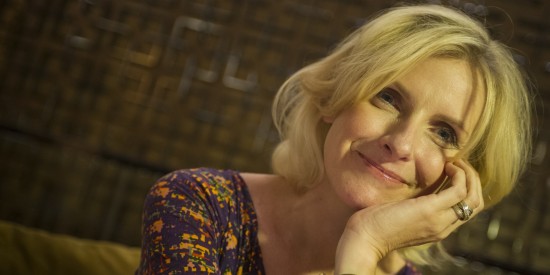Elizabeth Gilbert TED Talk: Your Elusive Creative Genius

If you’re a writer or an artist of any type for that matter, this is a TED talk that you’ll want to watch. Elizabeth Gilbert, the author of “Eat, Pray, Love” talks about the impossible things society seems to expect from artists and geniuses. She then provides the radical idea that instead of some individuals “being” geniuses, instead all artists “have” a genius as part of us. Her personal anecdotes, humorous style and surprisingly insightful thoughts about being an artist will make you question how you see yourself and other artists. See for yourself:
The talk delves into the expectations of those who choose creativity as a career / life choice, and how creative people manage the emotional risks of being an artist. If you have ever had any fears about the quality of your writing or have had others instill doubt about the artistic profession you have chosen to pursue, Elizabeth Gilbert has some advice on how you may want to approach this as your career progresses.
The main focus of the talk is about fear and doubt about being a writer (or another artist) and questioning why this comes about. Society as a whole seems to have an uneasiness regarding those who decide to go into an artistic occupation. As Gilbert points out, people don’t question those who are chemical engineers about whether they have fears about their profession as they often do to writers.
After taking the time to explain how artistic ability went from being considered an outside force in ancient times to being considered solely the product of the individual in more recent times, she questions if this is a good thing. Can the average artist survive when the expectations continue to grow and grow?
The solution to the problem is elegantly simple. It’s to step back and take a hint from earlier times. Instead of everything being solely the responsibility of the individual, realize that the “artistic inspiration” isn’t something that can necessarily be willed into being. For this, you may want to give some of the power to a distinct and separate part of you. That is, you’re doing the work, and you will do the work required on a daily basis, and you have the confidence that the inspiration will come to make it complete.
While this might sound quite complicated, it isn’t. Gilbert does an excellent job explaining the artists’ inspiration through examples so even those who don’t have an artistic background can understand the conflict which needs to be resolved. Most artists will instantly understand her fears and have likely experienced similar one to some degree during their career. While greatly beneficial to all those pursuing the arts, my guess is that this video may be even more beneficial to the partners of artists who may be able to get a better glimpse of the struggles and fears they must face when doing their trade.
If you have an extra 20 minutes to spare, sit down and watch this video right now. If you don’t, bookmark the video so that you can come back when you do have 20 minutes. At the very least, it will get you thinking about how society views those in the arts, and may give you some insight on how you can help yourself stay sane while doing what you love.


I think all writers have fears with writing, especially trying to live up to their last bit of writing. This is a good way of trying to deflect some of that fear.
You are right ginatt, I have that too! (Well i want to be a writer some day…)
Actually, this TED talk is one of the worst ones I have ever watched. She makes no points, offers no advice, and spend the whole time talking about how she will never live up to Eat Pray Love, but how that’s ok, because reasons, stupid reasons, and I hope I can save you the time of watching this utterly pointless TED talk. Dear OP: Have you nothing better to write about?
I liked it. I don’t think it was trying to give a specific point-by-point map for you to follow. I think the main point was to get you thinking about expectations with your writing and to ultimately right for yourself.
Your comments are based on the sad fact that a genius has never inhabited your work. If it had you would know how absolutely powerful and authentic this talk is.